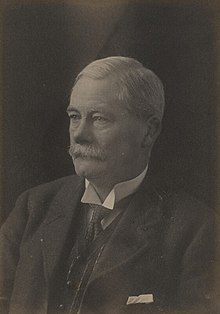Herbert Hall Turner
Herbert Hall Turner | |
|---|---|
 | |
| Born | 13 August 1861 Leeds, England |
| Died | 20 August 1930 (aged 69) Stockholm, Sweden |
| Awards | Bruce Medal (1927) |
| Scientific career | |
| Fields | |
Herbert Hall Turner
Biography
Herbert Hall Turner was educated at the
He was one of the observers in the Eclipse Expeditions of 1886 and 1887. In
His 1897 Royal Society candidature citation read:[5]
Secretary of the Royal Astronomical Society. Was Chief Assistant at the Royal Observatory, Greenwich 1884-1894. Author of various papers among which may be mentioned:-
- "On the correction of the Equilibrium theory of tides for the continents" (with G H Darwin, Proc.RS. vol lx)
- "Report of observations of total solar eclipse of Aug 29 1886" (Phil Trans. vol 180A),
- "On Mr Edgeworth's method of reducing observations relating to several quantities" (Phil. Mag. Vol24).
- "On Mr Leath's Intersects" (Monthly Notices R.A.S. vol xlvi).
- "On observations for coincidence of collimators at Royal Observatory Greenwich" (M, N. Vols xlv and liii).
- "On the variations of level against of the Transit Circle at Royal Observatory Greenwich" (M.N. Vol.xlvii).
- "On the longitude of Paris" (M.N. vol li).
- "On stellar Photography" (M.N. Vols xlix and liv)
- "On the R-D discordnace" (M.N. vol Liii p. 374 and 424, vol Liv p. 486, Mem Part. 3. vol ii);
- "On new forms of levels" (M.N. Vol Lii).
- "Conference of the Cape (1880) and Greenwich (1880) Star Catalogues" (Mem. Rs.F.S, vol Li).
- "On the reduction of measures of photographic plates" (N.N. vol LiV)

He co-edited the first official history of the Royal Astronomical Society along with John Louis Emil Dreyer, History of the Royal Astronomical Society 1820–1920 (1923, reprinted 1987).[6]
He died of a brain haemorrhage in 1930 at a conference in Stockholm. He had married Agnes Margaret Whyte in 1899; they had one daughter, Ruth.
A few months before Turner's death in 1930, the Lowell Observatory announced the discovery of a new planet, and an eleven-year-old Oxford schoolgirl, Venetia Burney, proposed the name Pluto for it to her grandfather Falconer Madan, who was retired from the Bodleian Library.[7] Madan passed the name to Turner, who cabled it to colleagues at the Lowell Observatory in the United States.[8] The new planet was officially named "Pluto" on 24 March 1930.[9]
His portrait, by Catharine Dodgson, hangs at New College, Oxford, at which he held a Professorial Fellowship attached to the Savilian Professor of Astronomy.
Honours
- Savilian Professor of Astronomy in the University of Oxford[10]
- Foundation Scholar of Trinity College, Cambridge
- 1st Class Math, with Exhibition, and 1st Class Physics, with Amott Exhibition and Medal, University of London, 1880
- Mathematical Scholarship and 1st Class Experimental Physics, University of London, 1882
- Second Wranglerand Sheepshanks Astronomical Exhibitioner, Cambridge, 1882
- 1st Class Math. Tripos, 3rd part, and 2nd Smith's Prize
- Fellow of Trinity. F.R.A.S.
- Chief Assistant at Greenwich Observatory.
- Fellow of the Royal Society, June 1897 [11]
Lectures
In 1913 and 1915 he was invited to deliver the Royal Institution Christmas Lecture on A Voyage in Space and Wireless Messages from the Stars.
Awards
- Bruce Medal (1927)
Named after him
- The crater Turner on the Moon
- Asteroid 1186 Turnera
Works
- Astronomical Discovery Gutenberg ebook with plates, originally published 1904.
References
- ^ "Clifton College Register" Muirhead, J.A.O. p52: Bristol; J.W Arrowsmith for Old Cliftonian Society; April, 1948
- ^ "Turner, Herbert Hall (TNR879HH)". A Cambridge Alumni Database. University of Cambridge.
- ^ "Chairs and Professors of Universities in the United Kingdom". Who's Who Year-book for 1905. 1908. p. 132.
- Bibcode:1931PA.....39...59C.
- ^ https://catalogues.royalsociety.org/CalmView/Record.aspx?src=CalmView.Catalog&id=EC%2F1897%2F25
- ^ "Royal Astronomical Society (RAS)". Encyclopædia Britannica.
- ^ P. Rincon (13 January 2006). "The girl who named a planet". Pluto: The Discovery of Planet X. BBC News. Retrieved 12 April 2007.
- ^ Claxton, K. M. "The Planet 'Pluto'". Archived from the original on 28 November 2011. Retrieved 29 November 2011.
- ^ "The Trans-Neptunian Body: Decision to call it Pluto". The Times. 27 May 1930. p. 15.
- ^ Turner, Herbert Hall (1904). Astronomical Discovery. Edward Arnold, London. p. 225.
- ^ "Library and Archive Catalogue". Royal Society. Retrieved 17 June 2022.
External links
 Works by or about Herbert Hall Turner at Wikisource
Works by or about Herbert Hall Turner at Wikisource- Works by Herbert Hall Turner at Project Gutenberg
- Works by or about Herbert Hall Turner at Internet Archive
